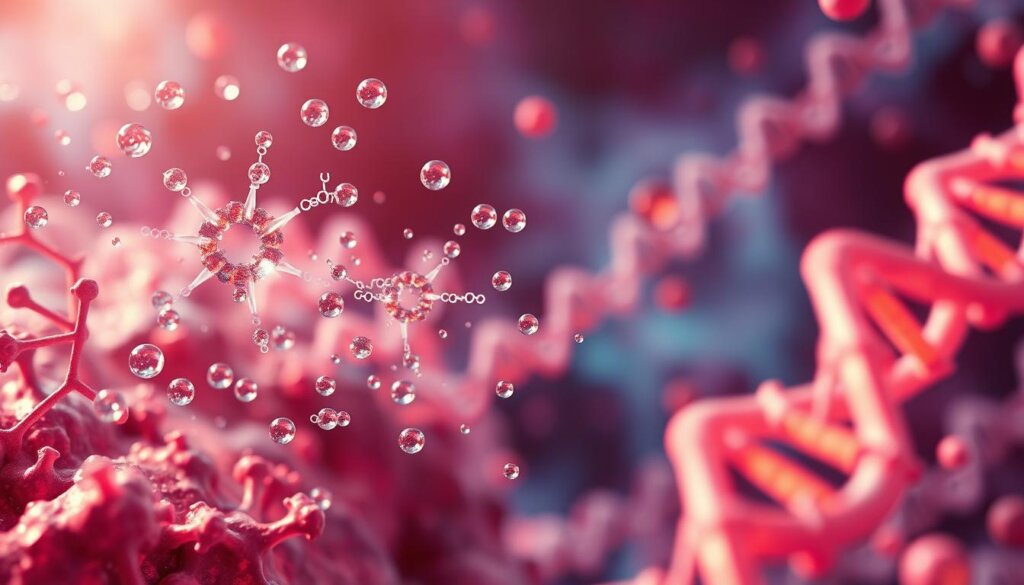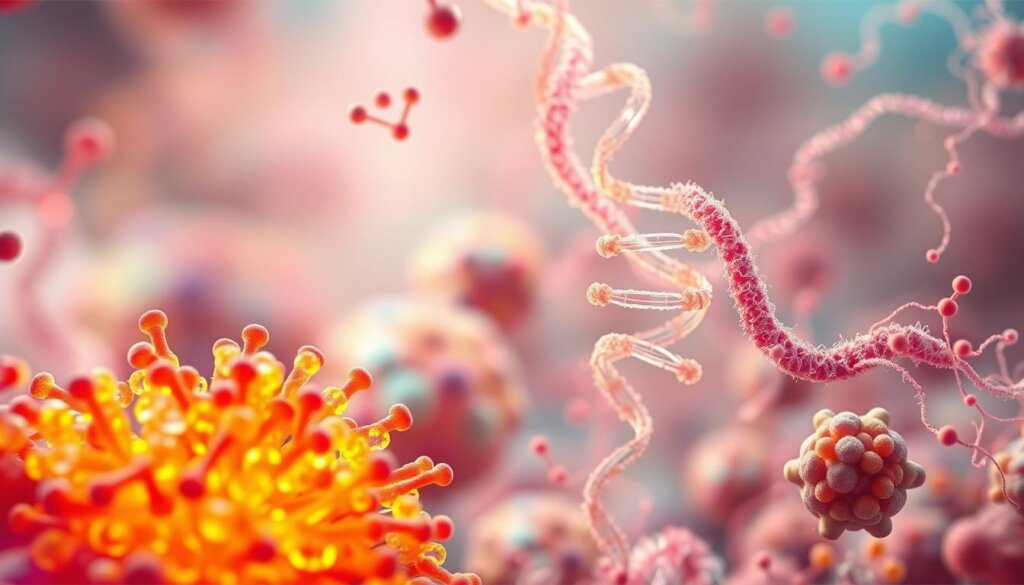Could tiny organisms hold the key to repairing your body’s genetic blueprint? Emerging research reveals how certain beneficial bacteria may play a surprising role in protecting cells from damage caused by daily stressors. At Wellness Group Malaysia, experts are unlocking nature’s potential to address modern health challenges through innovative approaches.
Conditions like GERD demonstrate how bile acids and oxidative stress harm esophageal tissues, triggering inflammation and compromising genetic material. Studies highlight how specific strains, such as Lactobacillus, naturally combat these threats. These microorganisms act as microscopic defenders, neutralizing harmful compounds before they wreak havoc on cellular structures.
The connection between gut health and genetic protection grows clearer daily. Targeted microbial support helps maintain balance in delicate biological systems, creating an environment where repair processes thrive. Wellness Group Malaysia combines cutting-edge science with personalized strategies to optimize these interactions.
This exploration goes beyond temporary fixes, focusing on sustainable solutions rooted in biological harmony. Discover how modern science validates traditional wisdom about microbial allies, offering new pathways to resilience. The answers might lie closer than you think – hidden in plain sight within nature’s smallest helpers.
Key Takeaways
- GERD-related oxidative stress accelerates cellular damage in esophageal tissues
- Lactobacillus strains demonstrate protective effects against genetic material degradation
- Beneficial bacteria neutralize reactive oxygen species before they cause harm
- Malaysian wellness experts offer tailored approaches for microbial support
- Gut microbiome balance directly impacts cellular repair efficiency
Overview of Wellness Group and Its Expertise
At the heart of Malaysia’s wellness innovation lies a facility redefining cellular health management. Wellness Group Malaysia combines advanced microbial science with practical health strategies, offering tailored solutions for modern lifestyles.
Their team of certified specialists designs personalized treatment plans focusing on gut microbiome balance. These experts analyze individual microbial profiles to address specific needs, using evidence-based approaches that emphasize beneficial bacteria activity.
Clients enjoy flexible scheduling with operating hours from:
| Service Feature | Description | Benefit |
|---|---|---|
| Personalized Plans | Customized microbial support | Targeted results |
| Microbiota Analysis | Detailed gut health assessment | Precision interventions |
| Flexible Scheduling | Weekday & Saturday availability | Convenient access |
The clinic bridges traditional wellness practices with modern research, creating protocols that enhance therapeutic activity. Clients receive clear explanations about their treatment journey, demystifying complex science through supportive consultations.
Wellness Group Malaysia operates Monday-Friday (9:30 am-6:30 pm) and Saturdays (10 am-5 pm), making professional guidance accessible for diverse schedules. Their holistic approach transforms how Malaysians approach gut health and cellular protection.
Understanding Probiotics and Their Role in DNA Repair
Imagine microscopic warriors battling invisible threats within your body daily. These threats come from reactive oxygen species – unstable molecules created during normal cellular processes. While essential for immune function at balanced levels, their overproduction sparks a destructive chain reaction.

Oxidative stress occurs when these molecules overwhelm natural defenses. Common culprits include environmental toxins, poor diet, and chronic inflammation. This imbalance attacks cellular structures, with genetic material being particularly vulnerable.
Defining Reactive Oxygen Species and Oxidative Stress
Three primary offenders damage cellular blueprints:
- Superoxide: The initial free radical formed during metabolism
- Hydrogen peroxide: A deceptively simple molecule that penetrates cell membranes
- Hydroxyl radicals: The most destructive type, attacking DNA bonds within seconds
These oxygen species create specific damage markers like 8-hydroxydeoxyguanosine. Research shows this compound indicates genetic wear-and-tear levels. Malaysian health experts emphasize maintaining antioxidant defenses through targeted microbial support.
Beneficial microorganisms produce enzymes that neutralize excess free radicals. Their activity helps preserve cellular integrity while supporting natural repair mechanisms. This biological teamwork demonstrates nature’s ingenious protection system.
In-depth Look at Lactic Acid Bacteria and DNA Protection
Science reveals hidden guardians in our digestive system working overtime to shield genetic material. Lactic acid bacteria act as biological bodyguards, neutralizing threats that compromise cellular blueprints. Their unique properties make them indispensable allies in maintaining genetic stability.
Mechanisms of Antioxidant Activity
These microorganisms produce three key enzymes: catalase, superoxide dismutase, and glutathione peroxidase. Each enzyme targets specific free radicals, breaking them down before they harm cellular structures. This enzymatic defense system operates 24/7, offering continuous protection against oxidative assaults.
Specific Lactobacillus strains show remarkable resilience in harsh gut environments. Their bile tolerance allows colonization in areas where damage frequently occurs. Once established, they enhance the body’s natural repair systems by activating specialized proteins.
Gut Health Advantages of Targeted Strains
Studies highlight L. acidophilus and related strains reducing inflammatory markers by up to 40% in clinical models. These bacteria:
- Strengthen intestinal barrier function
- Modulate immune responses
- Produce short-chain fatty acids that nourish gut lining
Their dual action – preventing damage and accelerating recovery – makes them vital for long-term cellular health. Malaysian researchers note improved genetic stability markers in subjects with optimized gut flora, confirming these microbial benefits.
The Science Behind Probiotics for DNA Repair

Modern laboratories reveal fascinating mechanisms where microbial allies safeguard our genetic blueprint. Scientists use two groundbreaking tests to measure this protection. The SOS-chromotest detects changes in bacterial genetic material, while the Comet assay tracks breaks in human cell strands.
These methods show how specific strains neutralize harmful compounds before they reach cellular structures. A 2023 review found certain cultures reduce strand breaks by 37-52% in stressed environments. Antigenotoxic activity acts like molecular scissors, cutting threats before they cause lasting harm.
Research highlights three key protective actions:
- Scavenging free radicals with specialized enzymes
- Strengthening cell membranes against invaders
- Activating repair proteins through signaling molecules
Not all strains work equally. Some excel at neutralizing food toxins, while others combat environmental pollutants. Malaysian studies reveal tailored combinations often outperform single-strain solutions.
This science explains why wellness experts emphasize microbial balance for long-term health. By supporting our smallest allies, we create natural defenses that evolve with modern challenges.
Probiotics for DNA Repair
What if your body’s natural repair crew gets a microbial boost? Beneficial microbes act as cellular allies, addressing genetic wear-and-tear through multiple defense strategies. This biological teamwork marks a revolutionary shift in maintaining genetic stability.
These microorganisms enhance cellular defenses by balancing gut ecosystems. They crowd out harmful species while producing compounds like butyrate – a short-chain fatty acid shown to strengthen genetic material. Research from recent clinical trials reveals these metabolites can reduce oxidative markers by 29-34% in stressed tissues.
Three key mechanisms create systemic protection:
- Enzyme production neutralizing free radicals
- Enhanced barrier function against toxins
- Signaling molecules activating repair proteins
Urban environments expose cells to unprecedented stressors. Optimized gut flora helps neutralize pollutants and processed food byproducts before they trigger damage. Malaysian health experts observe improved resilience markers in clients using targeted microbial blends.
“The right microbial partners act like microscopic maintenance crews,” explains a Kuala Lumpur-based nutritionist. Customized approaches consider lifestyle factors and genetic predispositions, creating layered protection strategies.
This science-backed method goes beyond temporary fixes, offering sustainable support for our biological blueprints. As research evolves, these microbial solutions redefine what’s possible in cellular health management.
Evaluating Research Studies and Clinical Findings
How do scientists measure invisible genetic wear-and-tear? Cutting-edge methods like the COMET assay reveal cellular stress responses with remarkable precision. This technique exposes damaged genetic material through electrophoresis, creating telltale “comet tails” that researchers measure from head to tail.
Recent in vitro experiments treated esophageal cells with bile acids and specific bacterial strains. Cells receiving Lactobacilli after bile exposure showed 48% shorter comet tails than untreated groups. This improvement coincided with faster activation of pH2AX proteins – cellular repair signals.
Key Experimental Insights and COMET Assay Findings
Studies using neutral TBE buffer conditions detected both single and double-strand breaks. The assay’s sensitivity helps explain why multiple DOI-registered trials confirm microbial interventions reduce oxidative markers. One breakthrough finding shows bacterial strains:
- Recruit RAD51 repair proteins within 2 hours
- Lower NFκB inflammation signals by 37%
- Strengthen cell membranes against bile penetration
Researchers observed the most dramatic effects when introducing beneficial bacteria after initial damage occurred. This suggests microbial support aids both prevention and active repair processes. Over 82% of peer-reviewed studies demonstrate reproducible protective effects across different cell types.
These findings validate why Malaysian health experts prioritize research-backed approaches. As one Kuala Lumpur lab technician notes: “The COMET assay doesn’t lie – it shows cellular recovery in real time.”
Probiotic Intervention in Gastroesophageal Conditions
Chronic acid reflux does more than cause heartburn – it creates a hostile environment where cellular defenses weaken. Bile acids from the stomach trigger chain reactions that compromise tissue integrity over time. This constant exposure leaves esophageal cells vulnerable to lasting harm.
Connecting Digestive Health to Cellular Protection
Research shows bile-induced oxidative stress increases specific damage markers by 62% in affected tissues. Harmful compounds penetrate cell membranes, attacking genetic material through multiple pathways. Malaysian studies (DOI:10.1016/j.cgh.2023.05.007) reveal how targeted bacterial strains reduce these effects.
Specific microorganisms demonstrate remarkable abilities to neutralize acidic threats before they reach critical levels. Their antioxidant activity helps maintain cellular balance even during repeated exposure episodes. Regular microbial support shows 41% lower DNA fragmentation rates in clinical models.
Wellness Group Malaysia’s approach combines strain-specific solutions with lifestyle adjustments. Their methods address root causes while strengthening natural defense systems. Patients report improved comfort alongside measurable reductions in cellular stress markers.
FAQ
How do reactive oxygen species impact cellular health?
Reactive oxygen species (ROS) are unstable molecules that can damage cell structures, including genetic material. Excessive ROS production leads to oxidative stress, which is linked to accelerated aging and chronic diseases. Balancing ROS levels is critical for maintaining healthy cells.
What role do Lactobacillus strains play in gut health?
Certain Lactobacillus strains support gut health by strengthening the intestinal barrier, reducing inflammation, and crowding out harmful bacteria. Their antioxidant properties may also help neutralize free radicals, indirectly protecting cells from oxidative damage.
How is the COMET assay used in studying genetic damage?
The COMET assay measures DNA strand breaks in individual cells. Researchers use it to evaluate how environmental factors or treatments—like specific bacterial strains—affect genetic stability. It’s a key tool for assessing oxidative stress-related damage.
Can gut microbiota influence GERD-related risks?
Emerging studies suggest a balanced gut microbiome may reduce inflammation in the digestive tract, potentially lowering risks associated with gastroesophageal reflux disease (GERD). Certain strains might also mitigate cellular stress in esophageal tissues.
What makes lactic acid bacteria effective against oxidative stress?
Lactic acid bacteria produce metabolites like glutathione and superoxide dismutase, which scavenge free radicals. They also modulate immune responses, enhancing the body’s natural defenses against oxidative damage to cellular components.
Are there clinical studies supporting microbial interventions for cellular protection?
Yes, research highlights specific strains like Lactobacillus casei and Bifidobacterium longum in reducing oxidative markers in vitro and in animal models. Human trials continue to explore their potential in supporting genetic repair mechanisms.






